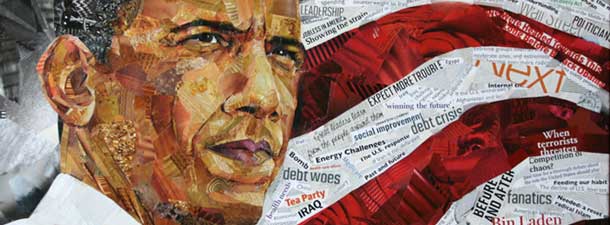
Malina Pasthira: Sustainable Architecture in Thailand
September 10, 2012
Who Holds the Wealth of Nations? China’s sovereign wealth fund and what the world should really worry about.
November 9, 2012[note]
ARCHIVE ARTICLE DEC 2011
[/note]
He’s still there, apparently. And despite crises, despite disappointments, despite unrest, and almost despite themselves, his supporters are still there too (mostly). They’re waiting for the guy they elected to show up. They are pretty sure he will.
Lily Tomlin once famously remarked that no matter how cynical you get, it’s impossible to keep up. In the USA of the Aughties, cynics have been run off their legs. From stolen elections to elective wars, from political fecklessness on one side to an apparent leavetaking from sense altogether on the other, it has often felt as though one’s personal sanity depends on developing a deeply yellow jaundiced eye.

So the election of Barack Obama in 2008 represented something of a respite – a moment where you could stop rushing to keep your cynicism equal to the demands of the times. I think Americans on both sides of the political divide felt some kind of awe on November 4, 2008 when we looked around and realized what we had done. John McCain himself, in his concession speech, remarked on the historic nature of the election of the first black president in our history. It was almost impossible not to be moved by the iconography of the moment, if nothing else.
That night, along with millions across the nation, I watched Obama give his victory speech in Grant Park in Chicago. There he told the crowd-estimated at more than a quarter of a million people-that “… if there is anyone out there who still doubts that America is a place where all things are possible, who still wonders if the dream of our founders is alive in our time, who still questions the power of our democracy, tonight is your answer…. It’s the answer that led those who’ve been told for so long by so many to be cynical and fearful and doubtful about what we can achieve, to put their hands on the arc of history and bend it once more toward the hope of a better day.” Now I am a sucker for a lyrically turned phrase, so after eight years of such tortured locutions as “is our children learning” or “they misunderestimated me,” I hope I’ll be forgiven for going all weak at the knees at that particular moment of Obama’s speech. Still, the most eloquent moment, for me, came when the camera moved in almost painfully close to the face of Jesse Jackson. He was—somewhat startlingly—not on stage with the candidate, but was down in the standing-room-only crowd. His expression was uncharacteristically solemn, open. Washed clean of the politician’s calculation and self-consciousness, he had an unwonted stillness, a dignity that seemed to reside in the very rawness of his emotion. His face was utterly naked and it was awash with tears.
Both the joy and the unbearable sorrow in Jackson’s unflinching gaze reminded me forcibly that Martin Luther King had been gunned down in front of that man’s eyes. Whatever you may think of Jackson, he had been there at a Ground Zero of sorts himself, had felt the first horrific impact of a blow that still wounds American history, even four decades later.
To see him present also at a scene that had been wildly unimaginable on April 4, 1968, gave me a sudden, dizzying view of the expanse we have travelled between those two points, and brought home the terrible price we have paid—and no doubt will continue to pay–to traverse it.
But coming now to the end of year three of the Obama administration, frankly, it’s sometimes almost impossible to pull up the emotions of that moment. In the last few years we’ve seen partisan fighting on steroids. We’ve witnessed the rise of such phenomena as the Tea Party movement, gripped by an hysteria over Obama that seems at times based on nothing more than the most lurid right-wing fantasies of “Commies” and “Socialists”, pulled from the farthest nooks and crannies of the old Cold War night closet. And since the infusion of Tea Party-backed politicians into Congress after the 2010 mid-term elections, the situation has only seemed to get worse, culminating this summer in the insane spectacle of the debt ceiling debate that left the whole country feeling as if it had fallen down the rabbit hole.

Even in more ordinary times, some drop in support might be expected when almost two centuries of historical and political hopes are projected onto a leader. But as election season approaches and protests have begun (and are spreading) among what would have once been considered Obama’s base, it seems that the hope and optimism generated by his historic election have not simply dissipated but have been positively atomized.
My first gut response when looking at this picture, as is common, I think, across the political spectrum when a situation doesn’t align with our liking, is to…blame the media! Certainly within the first couple months of Obama’s inauguration you were already seeing media memes that were setting him up for failure. Particularly in the more partisan media, it was completely acknowledged that the Right wanted to see him crash and burn—most famously by Rush Limbaugh who, even before the Inauguration, announced unapologetically, “I hope Obama fails.”
“The problem” explains J. Todd Ormsbee, an Assistant Professor of American Studies at San Jose State University in California, “is the way the corporate media works. Since the 1980s there’s been a marked shift in the news media in this country toward a pure profit model. They’re all owned by corporations now. . . . When broadcasting first came along [the news] was seen as a public service. Now it’s very much profit-driven entertainment. It’s all about ratings.
“This has had a massive impact on how politics is talked about in the media. So if you go back and look at the really surprisingly incisive coverage of, say, the Johnson-Goldwater campaign and then look at, you know, Katie Couric—there’s just no comparison.” With the media full of caricatures with the loudest, most outrageous voices all but drowning everything else out, it can be problematic to get a measure of the president’s true support (or perhaps lack thereof).
But is a persistent media narrative to blame here either? Poll questions and media tropes show us a flattened landscape. How do actual Obama supporters feel?
So, I tried to take the temperature, as it were, of some Obama supporters. A bit over a year ago, I began a series of conversations with a small number of them. As one might expect, I found that the picture took on a more threedimensional (and certainly more interesting) shape at the individual level.
These people live in far-flung corners of the country, at a remove from the power centres where the media messages are formulated. I do not make claims that they are typical, but mainly in the sense that I’m not sure there is a “typical” Obama supporter. Certainly, there are commonalities among those I interviewed, but their level of support varied from still strong and hopeful, to attenuated to the point of apathy. For the most part (with one exception), they approve of Obama, and back the Democrats, but not simply because of personal or party loyalty. Politically, and philosophically they are diverse in ways that are difficult to define.
So let me introduce them:
Adam Hansen is an Innovations Process consultant to corporations and lives in suburban New Jersey. He describes himself as “a walking contradiction in terms. My Facebook boil-down on my politics says ‘Obama Independent who leans Libertarian.’ I’ll be the first to acknowledge how completely convoluted that is. It probably doesn’t make sense to anyone other than myself. I do believe the best answers tend to be an integration of conservative and liberal views because I think that each side is acknowledging a part of reality that the other side often isn’t.”
Kelly Fielding, a clinical psychologist in private practice in a large city in the Pacific Northwest, is a conservative Democrat—though he is quick to insist on both sides of that description. He bristles a bit at the implied notion that conservative must necessarily be equated with Republicans. “I have what could be considered conservative views on some things, mainly on fiscal issues,” he avers, “but I’m also a Democrat.” He worked in the local Obama campaign in 2008, “out knocking on doors with my teenage kids.”
Ann Porter, on the other hand, is a Democratic partisan and clearly identifies herself as such. A computer programmer from New Orleans, she considers herself “fairly liberal, leaning toward the classical definition of progressive which is that society is going to progress and the best way to see that happen is to make plans for it and try to make it happen in a positive direction. I don’t like to call myself a straight ticket voter just because I don’t like the implication of that. But the reality is that I’ve always more or less voted a straight Democratic.” She is very active in Democratic politics locally.
Mina Estévez, of Brooklyn, is an English professor who teaches literature, film, and critical theory at a large public institution in the New York area. She is politically the farthest left of the four. She explains: “I’m a pretty traditional kind of Marxist, and thus have no current affiliation in the United States in political terms. It’s hard to talk about because it needs so much contextualization. The political terms that are understood under the label of the left or socialist or communist elsewhere in the world are like some foreign language here in America where there’s no connection to what those things actually mean. Suffice it to say I’m fairly alienated from the American political process. At the same time I’m completely fascinated with how politics functions in a larger sense.”
During our early conversations our group was still hopeful about Obama, quibbling a bit about specifics, but still basically supporting him. Now having stepped across the fault line of the 2010 midterms and the ensuing circus, the mood was very different—but not in ways you might think. They’re all feeling a little worse for wear, but are surprisingly consistent in their bedrock level of support for Obama. Also surprisingly (or perhaps not) discussion of Obama almost felt like a distraction in our most recent conversations.
Obama versus… The Volcano? (or après Barry, le deluge) A lot of the expressed support for Obama
A lot of the expressed support for Obama today came basically in the form of a recoiling from the choices on the Right. This was most striking with Estévez. Considering the fact that Obama is routinely tagged with the label of “socialist” or “communist,” it’s rather ironic—and telling—that Estévez has been the least enthusiastic about the president.
“I wasn’t really a partisan for Obama [in 2008],” she says. “I was very distant. I was interested in the race, but from the perspective of being sort of appalled at the spectacle on the Right—particularly at the point at which McCain announced his running partner…. That’s the only thing that really so worried me about the election that I hoped Obama would win.
“That’s still the case now considering that the alternative has gotten much worse. [Now] there are worse people on the Right than ever. I didn’t think it could get worse than Sarah Palin, but Michele Bachmann accomplished that easily. So it’s not that you have someone that you just don’t agree with, like McCain. Now you have actual crazy people. You read the kinds of things that Bachmann or Rick Perry or other people say and they’re either out and out lies or just garbled insanity. And there’s not even an attempt to fix or correct or even say, ‘Oh, I misspoke.’ You just blurt [something] out and then go on to the next thing you blurt out. That’s pretty frightening.”
Hansen shares that revulsion with the hard right, but he was, by contrast, an enthusiastic supporter of Obama in 2008. Early on, he felt that, “the big prize is getting us to a place politically on the national level where stupid partisanship could be left behind. Some partisanship can be useful, but the national discourse has polarized to a really dumb level.”
He’s been dismayed, however, to watch as things have gone from bad to worse. For that he places the blame squarely on the Republican camp.
“The Republican candidates were asked at the debate, if you could get a ratio of ten cuts to one tax increase, would you turn it down? And they all said they’d turn it down. For me it’s about being rational . . . . And that’s why it’s not been that traumatic for me to quit thinking of myself as being a Republican.
“Republicans need to understand some of the semiotics of this stuff and how it seems to reasonable people. I have to vote for Obama, because of the choices. That the top tier of Republican candidates could have people like Bachmann and Perry says something about Republicans that reasonable people are going to recoil from. Am I thrilled with [Obama]? No. Is there anything that even looks like it would grab my attention on the Republican side? No, no, no, no, no.”

Porter was also steaming about that moment in the Republican debate, but saw it as good for Obama. “I think his chances of re-election are really good,” she explained. “He’s actually polling really well against any theoretical Republican because all of the theoretical Republicans are completely insane. Would you walk away from a deal that was ten dollars in cuts to one dollar in revenue? Every single one of them [said they] would walk away from that deal and that deal balances the budget in 2012. . . . Oh, and if I hear one more person call Mitt Romney a moderate I may just have to hit something.”
Fielding—by his own declaration, the most conservative of the group—cut to the chase faster than any of them. “Look,” he said, “everybody who’s appeared so far on the Republican side is a frickin’ joke. And that includes Romney. It’s absurd to me that Romney is the safe bet of all of these Republican nutcases—Perry, Bachmann. Oh, my gosh, they’re just nuts! I haven’t seen anything from the other side that is in any way better than Obama . . . . The Tea Partiers – I’m sorry, but all they remind me of is that scene in Monty Python when the mob wants to burn the woman they’ve dressed up to look like a witch. Every once in a while somebody will yell, “burn her!’ And then they all chime in.”
Grown-Up in the House!
So all of this may sound like a sort of damning with faint praise, but most of them still like Obama for most of the reasons they liked him originally—even Estévez acknowledges his charisma—and work hard to keep things in perspective, see the bigger picture, have realistic expectations—all that adult stuff. In this respect they seemed rather battered, but mostly unbowed.
Says Hansen, “Obama has really accomplished some impressive things. I think if you’d said, somewhere in the middle of Bush’s term, that the next president would be a Democrat and that he’d accomplish what he has already accomplished, on paper you would have said, wow, how did that happen?
“We can quibble on timing and how much of a priority it was, but he finally removed Don’t Ask, Don’t Tell (DADT) from the military. Yeah, he should have done that immediately but now it’s done. And again you can quibble about the specifics of it but he’s still accomplished more on health care than anyone else did. He got a stimulus plan through. . . . . On top of all of this you have the overlay of the biggest macro-economic adjustment since the Great Depression . . . . Were we not going through that, I think it’s hard to paint a scenario where Obama is anything but an absolute rock star.”
Porter agrees. “Obama inherited a mess, an absolute mess,” she says. “And expecting a mess of that scale to be all better now is ludicrous. What’s he supposed to have done? So my feelings about the president and the presidency really haven’t changed. My frustrations with him are about what they have been. On the flip side, in some areas that are really important to me, he’s done things that are I think are exactly right. The repeal of DADT is just huge. [It’s often said about Obama] that he’s playing 12-dimensional chess and everybody else is playing Yahtzee. The fact of the matter is that DADT is over. It’s gone away, after thorough vetting by the military. And [the repeal] has got huge backing, the popular support for it is absolutely there. The military support for it is absolutely there.
“You could get somebody out in front and go whoop, whoop, whoop! Follow me! And that works real well for Republicans because everybody follows. Democrats aren’t like that. We aren’t going to say, yes, we will! Because what if we don’t like where he’s going? What if we have other ideas? So with DADT for example, there was a lot of steering going on. The end result had Obama’s fingerprints all over it. But he wasn’t out there leading the charge. He was putting the mechanisms in place that led to the end result. And it happened with his leadership, but without his cheerleading. There’s a difference between a leader and a cheerleader. They’re not the same thing.”
“He’s done a lot of good things,” Fielding insists. “In fact, if you look at the list of things that he said he was going to do, he’s succeeded in most of them. He’s pulling the troops out of Iraq. Things that people didn’t think could really occur in this amount of time and are done—health care, for example. . . . When he was elected everyone was screaming that he was going to destroy those programs. It’s absurd to me that the public has literally attempted to destroy real care for the elderly. I do appreciate that Obama’s stayed very strong on that. And contrary to the propaganda, Social Security is still a pretty strong animal.”

The Whole Damn Country Needs Ritalin…
In some ways, the latest conversations—though they ostensibly began about Obama—tended to come around to nagging worries about the country as a whole, its state of mind, as it were. It definitely plumbed deeper than mere conjecture about who may or may not win the presidency in 2012. Discussions of Obama, in this sense, almost became background noise.
“The general angst in the country is very, very different than it was a year ago,” says Porter. “Because a year ago, it was before the midterms. There was a whole lot of generalized anger from the Right that somebody had taken their toys away from them. And now that there’s a Republican Congress . . . a lot of that anger is being put into action in some very negative ways. The President is in a tough position right now. And once again he’s the only grown-up in the room. He’s dealing with people who are incapable of rational thought. Are things any better? No. You can’t cut your way out of 9% unemployment. Businesses are doing really, really well. And yet they’re still not hiring. There’s no incentive for them to hire. If anything what they’ve found is that their productivity is up because people are frightened, so they’re getting a lot more work for less money.”
“I’m disturbed by the short memory of the people of the United States,” says Fielding. “I think they’re forgetting what kind of disaster we had going into the Obama administration. And for people to actually believe that in this very short amount of time it could all be fixed is incredibly unrealistic. Really there has been a decent recovery. Yes, unemployment is still high and that’s a very big deal. I do wish there was more of a Rooseveltian push to get public works going so that we can put people back to work, repair infrastructure that needs it. It’s fundable and doable. But Obama needs to toot his own horn about [his accomplishments]. I’m tired of having him not defend his record.”
“We’ve become an increasingly pissy country,” complains Hansen. “We hated Bush, now we hate Obama. You know how babies finally at some point develop object permanence? I feel like we’ve lost any sense of object permanence as an electorate. We say what’s happening in this six-month window is the final answer. People are already starting to write Obama off for re-election. Are you kidding? This far out Hillary was the nominee last time around. Not only don’t we learn from deeper history, we don’t even learn from the most recent history. I know pundits get paid to pontificate and say provocative things that get attention, but it’s so distorting. And the Internet— which I love—you have to call out some of the weird things it does to the discourse. Memes get very incestuous and start having lots of deformed babies.”
Estévez whose support for Obama is mainly negative (“he’s better than the crazies”), sees it as not merely a short-attention span, but a real degeneration of the social compact. “One reason,” she says, “why these extreme kinds of politics have gained currency, is because we have a public that’s by and large incapable of evaluating things and only capable of reacting to things that happen to them individually. And that’s because the education system in the country has been destroyed. That’s something that’s been progressively happening for over twenty years now. A great deal of the public has never encountered anything about history, cannot think critically, and cannot think abstractly. So they can only react to things in terms of their own immediate individual emotion.”
Saying the C-Word
Estévez, also sees a sharp distinction between today and the political culture of an earlier era, when the kind of pragmatic, give-and-take that Obama seems to want to engender actually did happen. “The old shared idea, that I recognize from my childhood and early adulthood, about politics and the public good . . . was that you are trying to produce a better world for generations to come. That seems to be gone now. It’s like ‘fuck them. I suffered; everybody else should suffer too.’ You remember that quote from Thatcher in the 80s? Something like there’s no such thing as society, there’s just individuals? That
“It’s almost a triumph of capitalism in its rawest and most Hobbesian sense. It’s just a war of all against all. I think most Americans don’t have appreciation of the actual class system in which they live—how incredibly wealthy people are at the top and how much of the collective social wealth goes to them and how little goes to anybody else. And how they actually generate that wealth that is then appropriated by the top. Those are just concepts that are not available to people to help them make sense of things—or even to argue about and reject. It’s just invisible.”
As Ormsbee explains it, “in real pragmatism, in philosophical pragmatism. . .there’s a theory of valuation. And part of the process is that [you have] to hammer out shared values in order to have the democratic process. And the assumption has been, until I would argue Richard Nixon started killing it with the “southern strategy”, that there is a shared bedrock of values between the two parties. But then Reagan changed the entire political scene when he got into bed with the Christian Right in 1980. It was a purely political move. It was the only way a Republican could win. We were only six years out from Watergate. By making that move and changing the power structures of the Republican party—that’s kind of a Machiavellian pragmatism: just get and keep power—those old values of democratic deliberations basically ended. . . . So in that philosophical mode, what Barack Obama [does is not] pragmatism. What Obama’s doing is resulting in the loss of the bedrock of democracy. He’s capitulated. For example, I was in favor of the health care bill because it’s better than what we have; but I wasn’t in favor of it because it was going to save us. It’s basically a wealth transfer to the shareholders of insurance companies.
“There’s a lot of resentment [about all this] in [both the middle class and the working class] but they don’t see anyone to blame. In the U.S., the culture of capitulating to capitalist power is so strong. A boss will only lay you off because they economically have to. There’s never anything structural. It’s always bad luck. . . . There’s always this hope that ‘I’m going to get mine. . . .’ There’s this narrative about ne’er-do-well poor people sucking on the teat of the state who’re too lazy to get jobs. As a social scientist that stuff just makes my eyes roll. If there are no jobs, people aren’t lazy. There are no jobs.”
Always Look on the Bright Side of… oh, never mind
All these conversations reminded me of a joke that was current in Argentina during Juan Perón’s last years. His support also came from across the political spectrum (though perhaps a much broader spectrum than Obama’s). Perón’s supporters actually fought each other in the streets, and the joke goes that a group of right-wing Peronists had captured a group of left-wing Peronists and had lined them up for a firing squad. Just before the order was given to fire, one of the Leftists turns to the man next to him and brightly says, “So what do you think of this neat new tactic the Old Man’s come up with?”
It can feel like that as people continue to assert the Obama-as-Chess- Master meme, even while claiming to be disappointed or disgusted with him. That’s certainly a danger of a cross-spectrum base. As Porter described, those on the Left (such as it is in the U.S.) don’t really think like a rank-and-file. They do still support Obama (however reluctantly), but for considered reasons that they mostly work out for themselves rather than take on as an identity with an outside locus. That can give their support an ephemeral feel. On the other hand, a more subtle approval based on a longer, more integrated perspective can actually be surprisingly durable, despite disappointments.
This isn’t to say, obviously, that Obama’s support, even in this small sample, is as unalloyed as it was on that distant night in 2008. I certainly heard as much expression of despair as I did of hope (and often from the same individual in the same conversation).
After declaring Obama’s chances of re-election to be good, Porter suddenly shifted gears and musingly told me, “Sometimes I think the solution is to stop caring.” Estévez laughingly echoed her: “I just want a little trailer and to live somewhere far away from people. And to have wi-fi.”
As Porter summed it up: “We’re all still really supportive and really depressed.”




